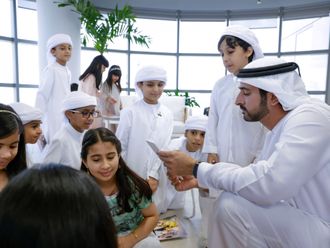Dubai: Dubai is positioning itself to become a city of the future thanks to substantial investment in science and technology, said American astrophysicist Dr. Neil deGrasse Tyson on Monday.
Addressing some of the 3,000 delegates from 125 countries attending the first of the three-day World Government Summit, Tyson, director of the Hayden Planetarium at the American Museum of Natural History, suggested Dubai’s hosting of the World Fair in 2020 as well as its mission to Mars are strong indicators that the emirate is on the right path to prosperity and scientific enlightenment.
“Innovation in science and technology are going to be the engine of the economy,” said Tyson, host of the popular science mini-TV series Cosmos: A Spacetime Odyssey.
He told a packed morning session on Monday that his first glance of Dubai flying in for the summit reminded him of the city of the future that he first saw advertised at the 1964 New York World’s Fair as a six-year -old child.
“I will never forget my trip to the World’s Fair. It was all about tomorrow,” Tyson said, showing a campy picture of a city of the future in years to come as portrayed in the 1960s. “I can say landing in Dubai, it reminded me of this picture. Maybe, here in the UAE, Dubai is the city of the future we were dreaming of in the 1960s.”
Noting that the hope and optimism of that time for science and technology has lost some of its lustre from a decade when man first landed on the moon, Tyson proferred that forward-thinking places such as Dubai and the UAE could be the new hope.
Referring to the upcoming Dubai 2020, Tyson said, “maybe an entire generation will remember this. This is the right place to put the city of tomorrow.”
Tyson reminded delegates of the Golden age of science between 800-1200 AD led by pioneering Muslim scientists in medicine, engineering, and astronomy.
He recalled as a teen growing up in New York city looking into the nightly heavens filled with stars and after some initial research, learned that two-thirds of all stars were named by Arabic astronomers many centuries ago.
It was a time defined by brilliant early Arab thinkers leading to algebra, algorithms, and Arabic numbers.
Had the “pace of discovery continued,” Tyson said, “…Muslims would have every single Nobel prize in the 20th century.”
Sadly, after the Golden Age of Islam disappeared into the history books, few remember the brilliance of the Muslim mind.
Case in point, Tyson noted that between 1900-2015, only three of 655 Nobel prizes awarded went to Muslims, or less than one per cent.
Urging Muslims to recapture their past by investing in their future sciences and technology, Tyson said “this has to change, it can change.”
Tyson said he believes a “next generation of scholars” from places such as Dubai will emerge.
Realizing that change will harness the potency of science that drives wealth in the 21st century, Tyson suggested.












